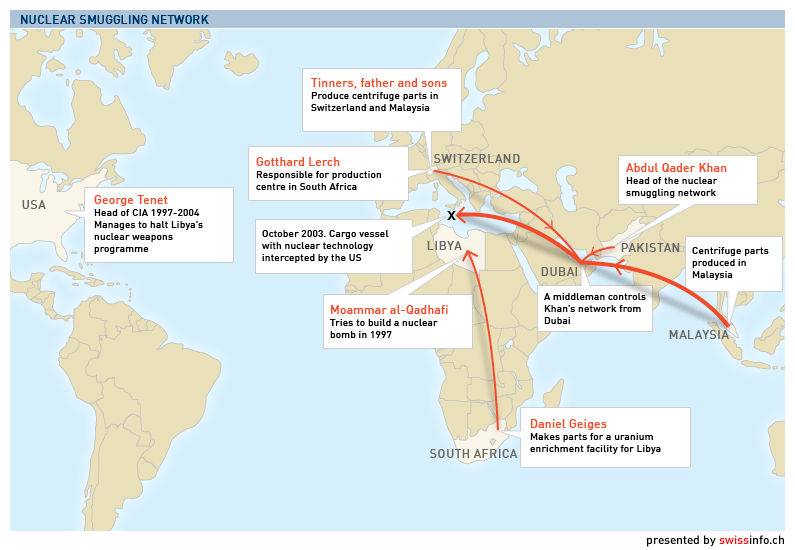Did Switzerland give in to US pressure?

The controversy surrounding the Swiss government's shredding of documents seized as part of a nuclear smuggling investigation continues to grow.
On Friday the federal criminal court rejected a bail application by two Swiss brothers accused of supplying parts for Libya’s nuclear weapons programme.
Experts criticise the lack of separation of powers and mounting speculation that the United States, concerned that its agents were implicated, had demanded the documents be destroyed.
“The government is not above the law – even when the security or the interests of the country are involved,” said legal expert Thomas Fleiner, director of the Federalism Institute at Fribourg University.
He said that neither the government nor parliament could interfere with the competency of the courts.
Niklaus Oberholzer, president of the St Gallen board of indictment, also believed the separation of powers had been breached, describing the incident as a “monstrosity”.
Last week the Swiss cabinet confirmed that sensitive evidence in a high-profile nuclear smuggling case had been shredded as per international guidelines.
Interior Minister Pascal Couchepin said detailed plans for the construction of an atomic bomb were among the papers seized after federal prosecutors began investigating a family of Swiss engineers in 2004.
Nuclear family
The father and sons – Friedrich, Marco and Urs Tinner – were suspected of helping to supply parts for Libya’s nuclear weapons programme through a trafficking ring run by Abdul Qadeer Khan, the father of Pakistan’s atom bomb.
All three are being investigated on suspicion of violating export laws on controlled goods and war materials. A trial date has not been set.
On Friday the federal criminal court rejected Marco and Urs Tinner’s appeal for bail, saying the brothers posed a flight risk and there was a danger of suppression of evidence. Their father, Friedrich, had been released from detention previously.
On May 23 Couchepin said Switzerland was not allowed to keep the documents under the terms of the international Nuclear Non-Proliferation Treaty, given the risk they could fall into “the hands of a terrorist organisation or a non-authorised state”.
For that reason, he said, the United Nations’ International Atomic Energy Agency (IAEA) had requested access to the documents and in November 2006 the Swiss cabinet formalised cooperation with the IAEA.
A year later the government decided to destroy the files, under the observation of the IAEA, according to Couchepin.
“Smoke screen”
Since then government shutters have closed and doubts about the official version of events have grown.
Andreas Zumach, a strategy expert from Geneva, said the government’s citing of the international Nuclear Non-Proliferation Treaty was an “absolute smoke screen”.
Zumach doesn’t believe the IAEA gave any orders to destroy the documents. Instead he thinks there was pressure from the United States.
There has been widespread media speculation that the US Central Intelligence Agency (CIA), which allegedly employed the Tinners, had requested the shredding of the documents.
A Swiss radio report, quoting “well-informed sources”, said the shredding took place under the supervision of a US official.
The government did not want to comment on the claims.
Kurt Spillmann, former director of the Centre for Security Studies at the Federal Institute of Technology in Zurich, said he could “well imagine” that the US was involved in the files’ destruction.
He pointed to the possibility that the documents contained statements by US agents.
Unanswered questions
Nevertheless, the exact timing of the shredding remains unclear.
What is known is that the cabinet took the decision to shred on November 14, 2007, when Christoph Blocher was still justice minister. Blocher has since been replaced by Eveline Widmer-Schlumpf.
However researchers from Radio DRS say there is evidence that the shredding did not actually occur until February this year.
If that is the case, the question arises where the documents were kept and why.
According to Radio DRS, Widmer-Schlumpf wanted to destroy fewer documents than planned, but the cabinet rejected her proposal.
It is a fact that the parliamentary financial audit delegation was only informed on February 8. The commission will present a report of its investigation in autumn.
The Green Party is demanding the appointment of a parliamentary investigating committee, saying in this case Switzerland got down on its knees before the United States.
Swiss neutrality and sovereignty appear not to count with the US, according to the Greens.
swissinfo, based on an article in German by Andreas Keiser
In 2004 the International Atomic Energy Agency supplied the Swiss authorities with a list of two companies and 15 individuals suspected of dealing in nuclear material with Iran and Libya.
Swiss engineer Urs Tinner, who is suspected of helping Libya obtain nuclear weapons technology, was arrested in Germany in October 2004. He was extradited to Switzerland in 2005.
His father Friedrich and brother Marco were also arrested by the Swiss authorities on suspicion of breaking the law on war materials by illegally exporting nuclear bomb-making equipment to Libya.


In compliance with the JTI standards
More: SWI swissinfo.ch certified by the Journalism Trust Initiative











You can find an overview of ongoing debates with our journalists here . Please join us!
If you want to start a conversation about a topic raised in this article or want to report factual errors, email us at english@swissinfo.ch.